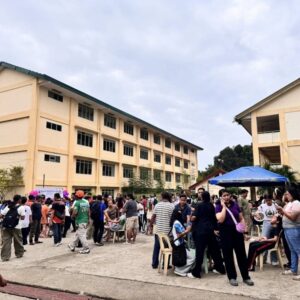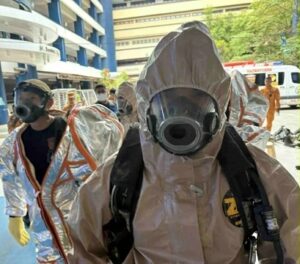MANILA, PHILIPPINES — The Philippines has been rattled by a series of recent earthquakes affecting regions including Cebu, Zambales, and most notably, Davao Oriental. Amid the widespread fear and displacement caused by the tremors—which some traditional beliefs attribute to divine wrath—the nation is closely observing the government’s response, particularly the decisive actions taken by President Ferdinand “Bongbong” Marcos Jr. (PBBM).
Confirming a direct response to the disaster, President Marcos Jr. traveled to Davao Oriental today to provide immediate relief and coordinate support with local government units (LGUs). The President emphasized the crucial need for rapid and effective disaster response. His itinerary has been closely monitored, with confirmation that he is currently in Davao del Sur and expected to be near Davao City, raising questions about his engagement with the local political leadership.

Battling Disinformation Amidst Disaster
However, the presidential visit has not been free of controversy, with a surge of fake news circulating on social media, particularly among supporters of former President Rodrigo Duterte (DDS). One glaring example was a false post claiming PBBM was selling rice in the Davao Region for a mere Php20—a clear misrepresentation of his relief efforts.
This proliferation of misinformation highlights a disturbing trend: how organized disinformation campaigns, reportedly linked to foreign-backed troll farms, can influence public perception, sometimes with an aim to promote candidates like Sara Duterte for the 2028 elections. The unfortunate effect is that these highly partisan campaigns often overshadow genuine government initiatives and national interest, with a segment of the population, including some in the Visayas and Mindanao regions, being particularly susceptible to believing these unverified reports.

Service Beyond Politics
Despite the political baggage and past criticism he faced from some Davao residents—who had, during the previous administration, reportedly used derogatory labels against him—PBBM’s decision to immediately travel to Davao Oriental demonstrates a commitment to place citizen welfare above political differences. This is a powerful example of how public servants should prioritize the needs of the affected population, irrespective of regional politics or past animosities.
It is essential to recognize that government aid, such as disaster relief assistance, is funded by taxpayer money, demanding transparent and efficient distribution. In this instance, PBBM has clearly demonstrated dedication and compassion in his role as the nation’s leader.
This administration’s response also draws a sharp contrast with the handling of past disasters, notably during the administration of former President Benigno “Noynoy” Aquino III, where response efforts were often perceived as slow or inadequate. PBBM’s swift mobilization signals a high degree of responsibility and a focus on prioritizing citizen welfare during emergency situations.
A Test of National Unity
As the visit unfolds, all eyes are on whether PBBM will extend his relief efforts to Davao City and engage directly with the local government and residents there. Such an interaction would be a critical test of how the President manages relationships with local leaders amidst a crisis, reinforcing the importance of national unity in disaster mitigation and response.
Ultimately, PBBM’s deployment to Davao Oriental appears to be unpoliticized and singularly focused on providing immediate aid to earthquake victims. Despite the continuous flow of fake news and criticism, the President has exemplified true public service. The takeaway is clear: in times of disaster, action and empathy are the true measures of leadership, not political allegiance or public opinion.
We await further updates on President Marcos Jr.’s visit to Davao City and Davao del Sur, observing how his ongoing relief efforts underscore his commitment to service above all.





